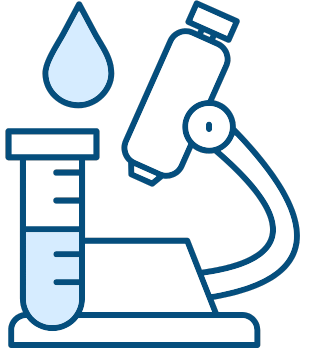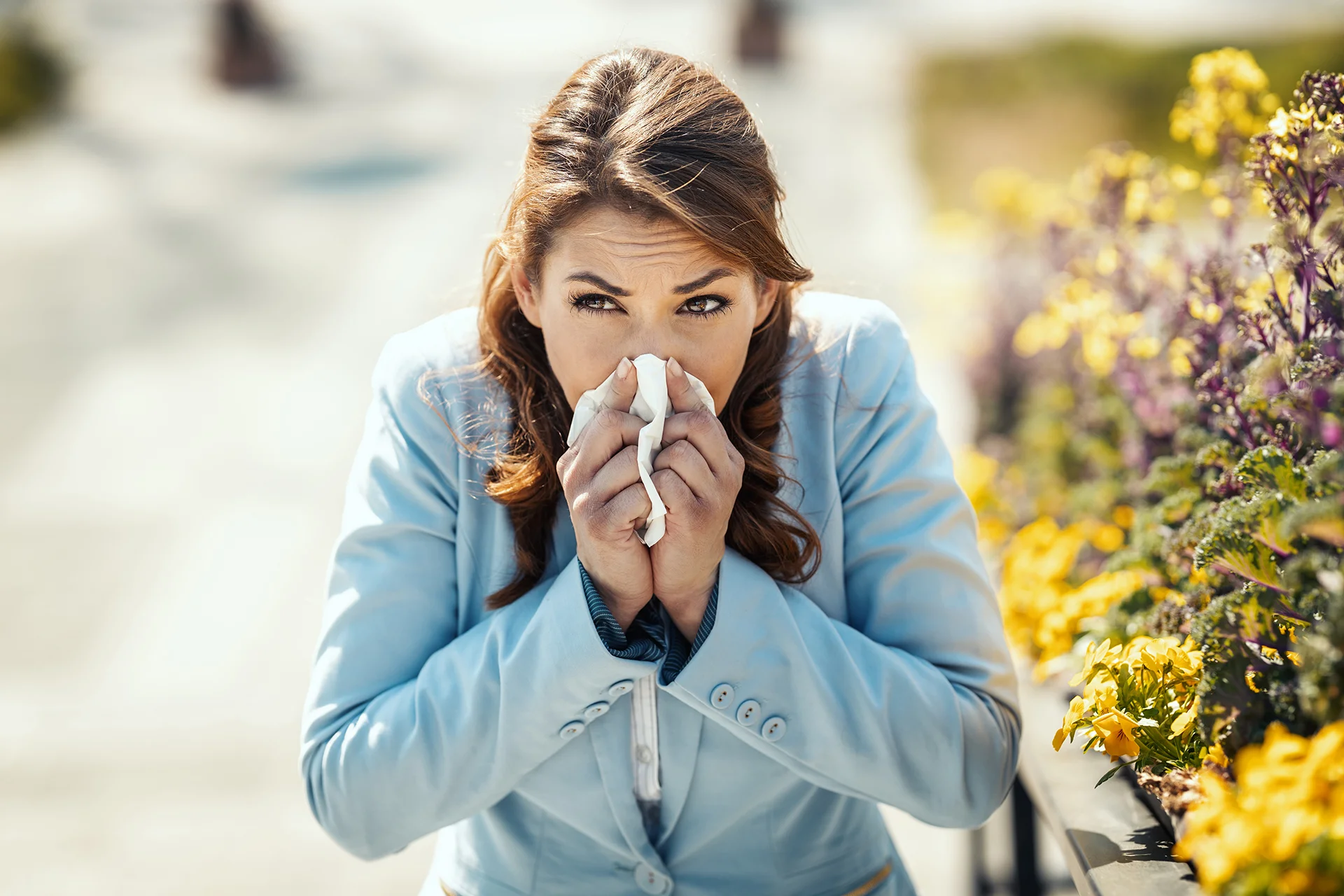Spring is something to look forward to – the warmer weather allows us to enjoy nature and fresh air. But spring is not always a happy time for everyone. For some, the blooming of plants in the warm season means discomfort – a dripping nose, watery eyes. Allergies are a common problem for many of us, but in fact, allergy symptoms can be experienced at any time in our lives, even by those who have not felt the problem before. Whereas in the past, allergy sufferers were few and far between, today more and more people complain of allergies. It is estimated that in a few years’ time, almost half of Europe’s population will suffer from some form of allergy. Why do allergy symptoms occur and can they be prevented? Together with Drops Clinic Family Clinic specialists, in this article we will discuss the causes of allergies, the symptoms they cause and the ways in which they can be treated.
Mūsų paslaugosWhat is an allergy?
An allergy is a disorder of the immune system, the body’s defensive reaction. Allergies occur as a response of the body’s immune system to certain substances that are too strong and inappropriate. Although these substances are harmless to most people, allergic people mistakenly perceive them as dangerous foreign bodies and defend themselves. Substances to which the immune system becomes hypersensitive are called allergens. These can be plant pollen, foodstuffs of one kind or another, animal hair, dust mites or even medicines.
Allergies can cause different symptoms in different people and affect different organs – the skin, the respiratory tract, the digestive system or even the heart and nerves. Although allergies are not a disease in themselves, their mechanisms can lead to various diseases in the body, such as asthma, eczema, allergic rhinitis or anaphylactic shock.
Why do allergies occur?
The causes of allergy are not entirely clear. They are thought to be linked to genetic predisposition and environmental factors. If a parent, or at least one of them, is allergic, their child is more likely to have an allergy, sometimes not necessarily the same one. However, allergies are not always present from birth – they can occur at any stage of life. Early childhood conditions are also thought to be important: breastfeeding, contact with animals, infections, etc.
The environment around us can also influence the development of allergies. For example, certain provoking factors in the body, such as city life, air pollution, smoking or stress, can increase the risk of allergies. On the other hand, living in a rural area and being in contact with natural microbes or parasites can strengthen the immune system and its response to allergens, thus reducing the risk of allergies.
When a substance enters the body, it sometimes triggers a defensive reaction, antibodies are produced and the body becomes sensitised. Then, when the body is exposed to the same allergen again, the immune system is activated and releases various inflammatory mediators such as histamine. These mediators cause blood vessels to dilate, smooth tissue to shrink and secretion from mucous membranes. This is what causes allergy symptoms.
Allergy symptoms
The signs of an allergy depend on how the allergen enters the body and which organs are affected. There are several main forms of allergies – food allergies, inhalant allergies, seasonal allergies (pollen allergies) and chemical allergies. Allergic symptoms usually appear quickly, within minutes or hours, but sometimes symptoms appear after a few days.
Although different organisms show different allergy symptoms, the most common allergy symptoms are:
- runny nose, sneezing, itchy nose and congestion;
- red, watery and itchy eyes;
- skin rash, itching and swelling;
- coughing, shortness of breath, asthma and bronchospasm;
- itching and swelling of the mouth and pharynx;
- abdominal pain, diarrhoea and vomiting.
If the allergen passes through the gastrointestinal tract, abdominal pain, diarrhoea and vomiting are more common symptoms. Skin symptoms such as rashes and itching are also possible, but are more common when the allergen comes into direct contact with the skin. Sneezing, sneezing, red eyes, coughing, and similar symptoms occur when the allergen enters the body through the respiratory tract.
Allergy symptoms can be mild or severe. The most severe allergic reaction is anaphylactic shock, which can cause breathing difficulties, a drop in blood pressure and loss of consciousness. Anaphylactic shock is a life-threatening condition and requires urgent medical attention.
Determination of allergy
If you experience allergy symptoms or suspect an allergic reaction, you should seek medical advice. Your family doctor will examine you and, after assessing your condition, will advise you on how to proceed and prescribe further tests or treatment. Sometimes, your GP may refer you to an allergist for a more detailed analysis.
Any allergy diagnosis starts with a medical history – asking the patient about the allergy, its symptoms, the duration of the symptoms, as well as their lifestyle. It is also important to find out about the patient’s family history and other allergies. The doctor carries out a physical examination together with further tests if necessary.
Laboratory tests are used to detect allergies. A blood test may be used. This tests the total concentration of Immunoglobulin E (IgE) in the blood and the specific IgE antibodies to a specific allergen. Another common laboratory test is the allergy skin test, which involves dropping a solution containing the allergen on the skin or making a small wound on the skin with the allergen. This is a painless, quick and informative method of allergy detection. If redness or swelling appears after 15-20 minutes, this indicates a reaction of the body to the allergen
Our servicesCan only an allergist diagnose allergies?
An allergist is a medical specialist who has special qualifications to diagnose and treat allergic diseases. However, it is not always necessary to consult an allergist to diagnose or treat allergies. Your family doctor can also identify the main symptoms of allergies and prescribe symptomatic treatment. An allergist is needed when the cause of the allergy is not clear or when a more detailed analysis is needed. An allergist can also advise on preventive measures and long-term care.
Other specialists can also diagnose allergies, depending on which organs are affected – a dermatologist if it is the skin; a pulmonologist if it is the respiratory tract; a gastroenterologist if it is the digestive system; a cardiologist if it is the heart and blood vessels, etc. The most important thing is to see a doctor when allergy symptoms appear and not to try to treat or ignore them yourself.
Treatment options for allergy
The type of allergy, which organs are affected, and how severe the allergy symptoms are have a lot to do with the treatment of allergies. Allergy treatment also depends on the patient’s individual characteristics. The main allergy treatments are:
- Allergen avoidance. This is the first and most important step in reducing or eliminating allergy symptoms. If the allergen is known, efforts should be made to minimise or avoid contact with it. Of course, this is not always possible – for people suffering from seasonal allergies, avoiding allergens is almost impossible.
- Symptomatic treatment. This is the second step in suppressing the immune system’s reaction to the allergen and reducing the symptoms of allergy. The most common drugs are antihistamines, which block the effects of histamine and reduce the symptoms of allergy – itching, redness, swelling, etc. Antihistamines can be taken as tablets, syrup or drops, or applied to the skin as ointments or creams. Corticosteroids, which have a strong anti-inflammatory effect and reduce bronchospasm, may also be prescribed. Corticosteroids can be administered by inhalation (inhalation), by nasal spray (nasal spray) or by application to the skin. Symptomatic treatment, although effective, does not eliminate allergies.
- Specific immunotherapy. Allergen-specific immunotherapy is used to cure the allergy or to reduce its incidence in the long term. It induces tolerance to the allergen and desensitises the body to it. This is done by gradually increasing the dose of the allergen in the body. Specific immunotherapy is most commonly used for allergies to inhaled allergens such as pollen, house dust mites, animals and moulds.
- Intravenous therapy. Intravenous therapy is also an excellent way to treat allergies. It delivers vitamins, minerals and nutrients directly into the bloodstream so that they are absorbed more quickly and efficiently. Intravenous therapy strengthens the body with a variety of vitamins and other beneficial substances so that the body fights allergens more effectively and prevents inflammation. In the event of an allergy flare-up, the above medicines can be administered intravenously and are more effective in eliminating existing symptoms such as red eyes, runny nose and skin rashes.
Allergies are a common and unpleasant condition that causes a lot of inconvenience and reduces quality of life. An allergy occurs when the body reacts to a substance – an allergen – and accepts it as a danger. Allergies can manifest themselves in a variety of symptoms, which usually depend on the way in which the allergen enters the body. Although an allergy is not a disease in itself, it can lead to a variety of illnesses, sometimes life-threatening (asthma, anaphylactic shock). It is therefore important to seek immediate medical attention if you feel any allergic symptoms or suspect that you have an allergy, in order to determine the cause of the allergy and its treatment. Do not hesitate to contact Drops Clinic’s expert team of doctors who will listen to your problem and help you regain your quality of life immediately.




